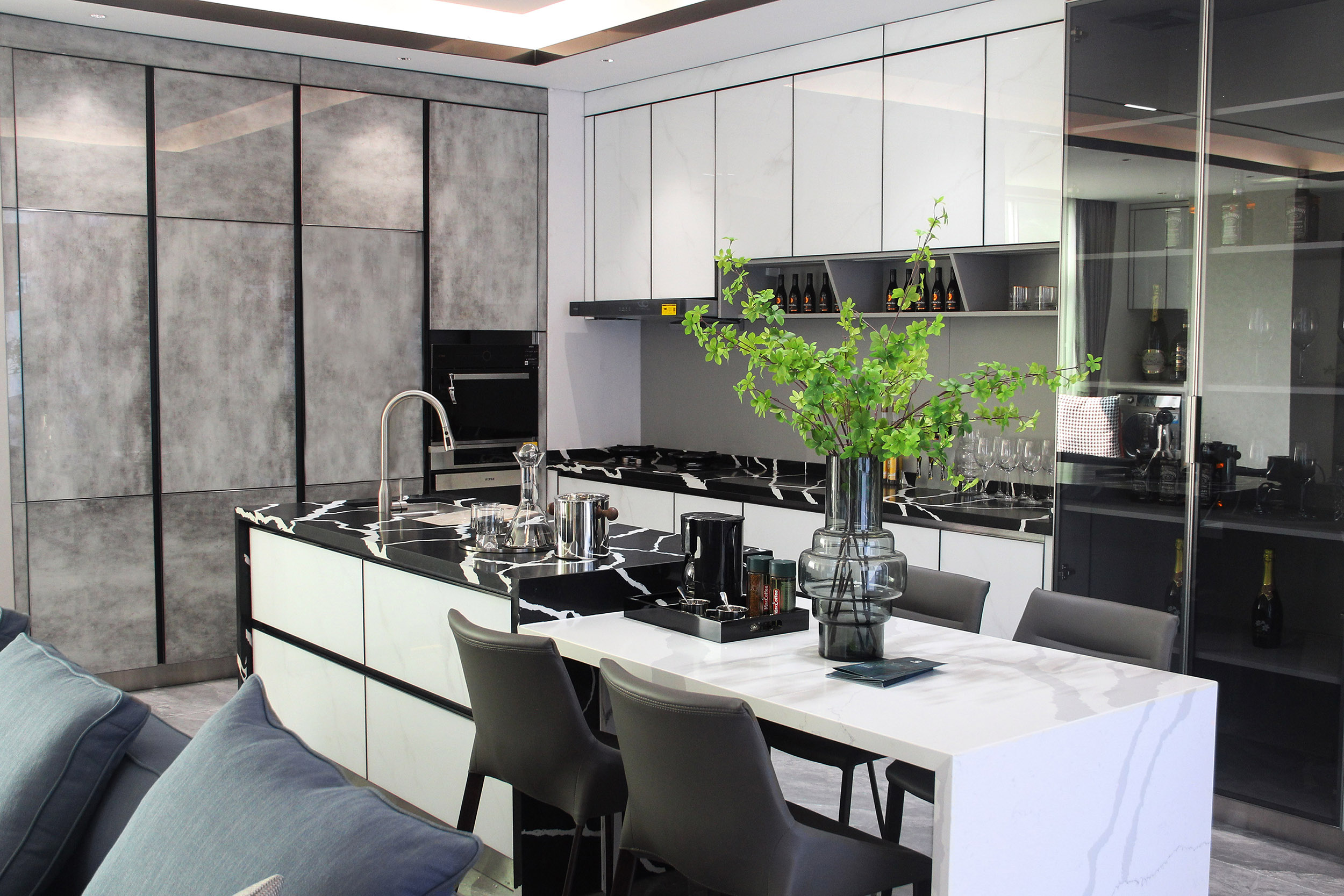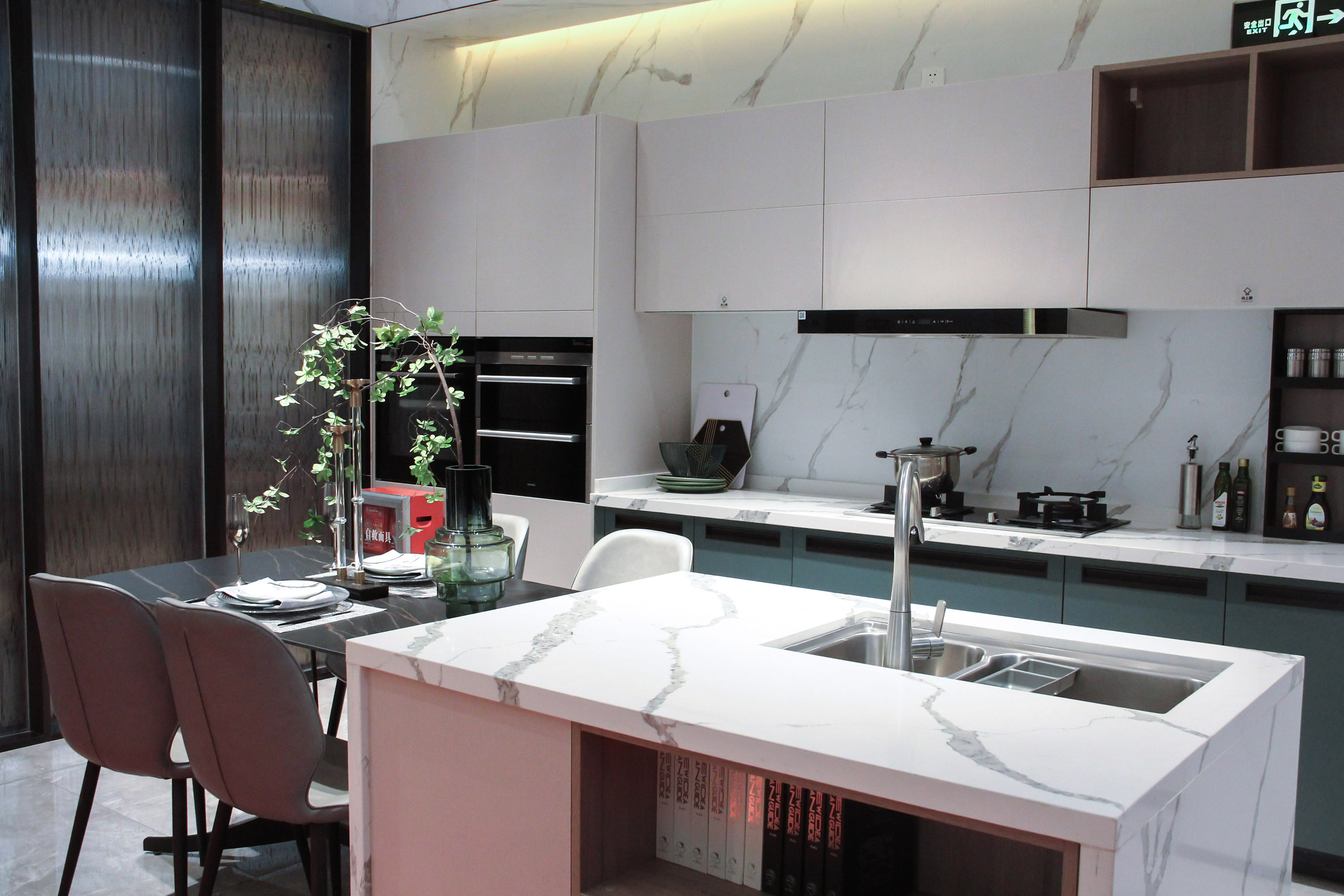When you're planning to upgrade your kitchen or bathroom, the countertop is one of the first things that come to mind. Not only does it serve as a functional workspace, but it also sets the tone for the entire room. Among the myriad of options available today, custom quartz countertops have gained significant popularity.
But how do they stack up against other materials like natural stone or engineered surfaces? Let’s dive into the pros and cons of custom quartz and see how it compares to other common countertop materials.
Custom quartz countertops are popular for many reasons, particularly for their practical and aesthetic benefits.
● Durability: Quartz is incredibly hard, ranking just below diamond on the Mohs scale. This hardness translates to exceptional resistance against scratches, chips, and cracks, making quartz ideal for high-traffic areas like kitchens. Whether you’re chopping vegetables or placing heavy cookware on the surface, quartz can handle the wear and tear of everyday use without showing signs of damage.
● Non-Porous Nature: One of the standout features of quartz is its non-porous surface. Unlike natural stone, which can absorb liquids and harbor bacteria, quartz is impervious to spills. This quality makes it exceptionally easy to clean and maintain—just a simple wipe with soap and water will do the trick. Additionally, because quartz doesn’t absorb moisture, it doesn’t require regular sealing, saving you both time and money over the lifespan of your countertops.
● Aesthetic Flexibility: Since quartz is engineered, it offers an extensive range of colors and patterns. From classic marble-like veins to bold, modern designs, the customization options are virtually limitless. Whether you want a minimalist white slab or a dramatic, dark countertop, quartz can be tailored to match your exact specifications, fitting seamlessly into any design scheme.

While custom quartz has many benefits, there are some drawbacks you should be aware of before making a decision.
● Cost: Quartz countertops are generally more expensive than other options, such as laminate or even some natural stones. The price can vary depending on the quality of the quartz, the complexity of the design, and the installation process. For homeowners on a tight budget, this can be a significant downside. However, it's essential to consider that the durability and low maintenance of quartz can offset the initial cost over time.
● Heat Sensitivity: Although quartz is durable, it’s not entirely impervious to heat. Placing hot pots or pans directly on the surface can cause damage, including discoloration or even cracking. Unlike natural stone, which can withstand high temperatures, quartz requires a bit more care. Using trivets or hot pads is essential to protect your investment, which might be seen as a minor inconvenience for some homeowners.
● Artificial Appearance: While quartz can mimic the look of natural stone, some purists argue that it lacks the authenticity of materials like granite or marble. The uniformity of quartz’s appearance, which is a selling point for some, can be a drawback for those who prefer the unique, organic patterns found in natural stone. This is something to consider if you’re aiming for a more traditional or rustic look in your space.
When comparing custom quartz to natural stone, several key differences and similarities emerge.
● Maintenance: One of the biggest advantages of quartz over natural stone is maintenance. Natural stone, such as granite or marble, requires regular sealing to prevent stains and bacterial growth. Quartz, being non-porous, eliminates this need, making it a more convenient option for busy households. The low maintenance of quartz appeals to those who want a beautiful countertop without the hassle of constant upkeep.
● Durability and Resilience: Both quartz and natural stone are durable, but they excel in different areas. While quartz is highly resistant to scratches and stains, natural stone can handle heat better. For example, granite is known for its ability to withstand high temperatures, making it suitable for kitchens where hot cookware is frequently placed on countertops. However, quartz’s vulnerability to heat damage means it requires more cautious use.
● Aesthetic Choices: Natural stone offers a unique beauty with its organic patterns and variations, something that quartz can replicate but not entirely match. Each slab of natural stone is one-of-a-kind, which is a significant draw for homeowners looking for a distinctive, high-end look. Quartz, on the other hand, offers consistency in color and pattern, which can be advantageous for those seeking a uniform design across large surfaces or multiple rooms.
Custom quartz countertops also have to be weighed against other engineered materials, such as solid surfaces and laminate.
● Consistency and Customization: Both quartz and other engineered materials offer consistent patterns and colors, which can be a huge advantage in terms of design flexibility. However, quartz generally provides a more luxurious and durable option compared to materials like laminate. Laminate, while budget-friendly, lacks the high-end appeal and long-term durability of quartz. Solid surfaces, come closer to quartz in terms of quality but still fall short in hardness and scratch resistance.
● Installation and Seams: When it comes to installation, quartz, and other engineered materials can be installed with minimal visible seams, which is a significant advantage over natural stone. However, the installation process for quartz tends to be more complex and costly than for materials like laminate. While this can add to the overall expense, the seamless look and durability of quartz often justify the higher installation costs for many homeowners.
● Environmental Impact: Engineered materials like quartz are often more environmentally friendly than some natural stones. Quartz is made from abundant raw materials and can be manufactured using sustainable practices. Some quartz countertops are even made with recycled materials, which adds to their appeal for eco-conscious consumers. In contrast, the extraction of natural stone can have a more significant environmental footprint, including land degradation and energy consumption during the mining and transportation processes.

In today’s eco-conscious world, the environmental impact of your countertop material is more important than ever.
● Sustainability of Quartz: Quartz countertops are often considered a more sustainable choice compared to natural stone. The production of quartz surfaces typically uses abundant and recyclable materials, reducing the environmental footprint. Additionally, some quartz manufacturers prioritize eco-friendly practices, such as water recycling during production and minimizing waste. Choosing a quartz countertop from a company that values sustainability can contribute to a more environmentally responsible home.
● Comparing to Other Materials: When comparing quartz to other materials, such as granite or marble, the environmental impact varies. Natural stone extraction involves quarrying, which can lead to land degradation and significant energy consumption. Engineered materials like laminate, on the other hand, may involve the use of synthetic chemicals and non-renewable resources, making them less eco-friendly. Quartz strikes a balance between sustainability and luxury, making it an appealing option for environmentally conscious homeowners.
● Lifespan and Durability: Another environmental consideration is the lifespan of the material. Quartz’s durability means it lasts longer, reducing the need for replacement and the associated environmental costs. While it may require an initial investment, the long-term benefits of quartz include less waste and a lower overall impact on the environment.
Choosing the right countertop material is a significant decision that can impact both the functionality and aesthetics of your space. Custom quartz offers a compelling mix of durability, low maintenance, and design flexibility, making it a top contender in the world of countertops. While it comes with a higher price tag and requires some care to avoid heat damage, its benefits often outweigh the drawbacks. When compared to natural stone and other engineered materials, quartz stands out for its balance of beauty, resilience, and sustainability.
Whether you’re renovating a kitchen, updating a bathroom, or designing a new home from scratch, custom quartz countertops provide a reliable and stylish solution that will serve you well for years to come.